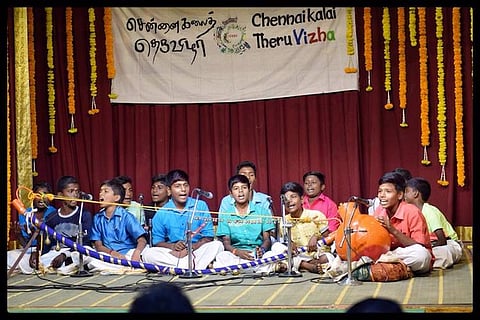

Urur Olcott Kuppam Vizha, a cultural festival that changed the way Chennai regarded its arts, has now become the Chennai Kalai Theru Vizha. This renaming is perhaps a reflection of the festival’s success in these past four years.
While the idea and the spirit behind the festival - celebrating oneness - remains the same, its reach has surely widened. This year, the Vizha is going places, quite literally.
As part of their ‘North Chennai in Mylapore’ programme, the festival gave many a taste of what the sabhas in Mylapore have been missing for so long. Saturday was quite a musical awakening with Villupaatu, Tamil Gaana and Tamil Sufi songs being performed at a sabha that had, until then, only resonated with classical Carnatic songs. The evening began with a Villupaatu session, a storytelling folk art form, presented by a group of young children from Ennore who spoke about their lives and their homes.
Dressed in a bright pink saree pulled around her shoulders and her hair tied back in a neat bun, Vyasarpadi Muniammal began with ‘Yethanai siraiyai kanden nanum kanden kadasiraiyai’, a moving song about life behind bars penned by her brother, based on his personal experiences. It wouldn't be an exaggeration to say that her voice that evening pierced through hearts.
With just one percussionist to accompany her, Muniammal’s songs evoked longing and joy - in some, she sounded like a shy, young girl and in others, the weight of having lived a hard life seeped through her voice.
After a couple of songs, she spoke: “I come from a poor family. This is my first stage. Do you like my songs? This is my first…” the rest of her sentence was drowned by loud cheering and whistles. Enthused, Muniammal continued, this time a song dedicated to her daughter ‘Annamitta Kaigaluku’.
By the time she sang her fourth, the audience picked up her mood, and this time she was not just accompanied by the dholak but also by the audience clapping along.
Muniammal is the aunt of Muthu, a member of The Casteless Collective band, and a source of inspiration for him. When she ended the song, Muthu said, “My atthai (aunt) used to sing in funerals and for fun at home. She was quite nervous to sing on this stage which is her first.”
Muniammal was followed by singer Aboobacker, who filled the rest of the evening with the choicest of Tamil Sufi songs penned by Kunnanudi Mastan Sahib, a Sithar (ascetic), a Muslim poet and an intellectual who lived during the early 19th century.
Extolling Mastan Sahib’s Manonmani Kanni, historian and writer Kombai S Anwar said, “He imagines god to be his bride and lover. The work is so beautiful that it has given me sleepless nights. Everyone should read experience his works.”
While these songs have been composed in familiar tunes, the lines have been penned by renowned Tamil Muslim poets. The popular Tirupugazh by Arunagirinathar that begins with ‘Muthaitharu’, and is dedicated to Lord Muruga, inspired Kasim Pulavar of Kayal Pattinam to write one on Nabigal Nayagam. The song, which sounds just like the original, differs in its meaning.
The evening proceeded to a fusion dance piece presented by the Flying Bees Dance Troupe from OMR, Chennai.
The second day of the programme, too, presented a mix of events ranging from a parai and oyilattam (Tamil folk music and dance forms) performance followed by an oppari (lament) presented by JP Veeramani, and a session headed by director Pa Ranjith where he was in discussion with "achievers from North Chennai". Day 2 ended with Ryan and the Undercovers, an Anglo Indian band, performing western music.
Photos courtesy: Facebook/Chennai Kalai Theru Vizha
Speaking to TNM, Nityanand Jayaraman, one of the co-founders of the festival, said that although the festival indicates a healthy change it has to gain more prominence. “We need more such inclusive festivals happening in public spaces like the beach, park, etc,” he observed.
This time, Nityanand added that the festival has allowed them to visit and throw the spotlight on several other locations in the city. “The prime focus has always been colliding art forms, spaces and people, and this time we’ve shifted focus to two key locations - Korukkupet and Ennore where the festival will culminate.”
While those at Urur, the festival’s birthplace, are dismayed that the Vizha will not take place in their village this year, they are glad for how it has turned out. K Saravanan, a member of Urur’s fishing community, said, “The Vizha gave us the spotlight we were hoping to get. We’ve now got our drainage lines fixed and we also made good friends through the Vizha. It is time the Vizha does its magic in other places as well.”
Chennai Kalai Theru Vizha has a great line-up of events planned for the next few weeks. January 27 will be a musical treat with singer Chinmayi performing at the Besant Nagar beach, followed by a fiery performance by The Casteless Collective. The evening will begin with paraiattam by Pandian and Aruna.
On February 1 and 2, the Chennai Kalai Theru Vizha will take place at Driver Colony, JJ Nagar in Korukkupet, and on February 10, it will head to Ennore and will conclude with a Carnatic music concert by Sangeetha Sivakumar and TM Krishna.
For more details, check out their Facebook page here.